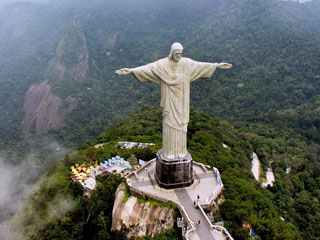
|
Full Day Corcovado - Sugar Loaf Tour with Lunch
Tour operates daily, leaving at 9h00.
The Corcovado mountain has been Rio's top attraction widely sung by famous Brazilian composers. Tour will leave the hotel riding along the beaches of Rio and taking the Lagoa Rodrigo de Freitas (lagoon) will reach the Rebouças tunnel, a 2.6 km long complex that links the southern and northern parts of the city cut in half by the Tijuca ridge that makes Rio the only city in the world to have a National Park 5 minutes from downtown. Reaching the Cosme Velho district, tour members will take a cogwheel train of Swiss manufacture that climbs the mountain from its base at 15 mts to almost its summit at 670 mts. The very top is reached by climbing a flight of steps reaching the base of Christ the Redeemer statue. This statue covered with a mosaic of soapstone is one of Rio's finest Art Nouveau monuments. The view, from this vantage point, with the surrounding Tijuca National Forest spreading below and a circle of mountains closing the horizon at the very back of the Guanabara bay. Stop for lunch at one of the finest restaurants in town.
We will follow to Sugar Loaf, known world over as Rio's postcard and a must to visit.. Sugar Loaf is reached on a two-stage cable car ride. This cable car, in operation is of Italian manufacture and takes 80 persons per trip on a 2-minute ride, each stage. The first stage, Morro da Urca - barely 170 mts high, has a restaurant, amphitheater, a helipoint for scenic rides and a privileged view of the Yacht Club and Botafogo Bay. The second stage takes one up to the Sugar Loaf - thus named because of the loaves of sugar that were commonly used by the Portuguese at the time of the discovery of the city.
The all-encompassing view of this privileged 270-meter high lookout is unrivaled.
We will head to downtown where Rio's major colonial buildings are located and where the city started to develop. We will pass by the Marechal Floriano Square, also known as Cinelandia. This square concentrates the best of late 18th century French style architecture in Rio de Janeiro: the Municipal Theatre, a scaled-down of the Paris Opera; the Fine Arts Museum; the National Library (reputed worldwide for the copies of Gutemberg's bible and other first editions dating back to 1500 - brought to Brazil by the Imperial Family of Portugal when they moved to Brazil fleeing Napoleon's threat). A fine example of baroque art - and usually unnoticed - the Sao Bento Monastery, which can also be visited.
|

